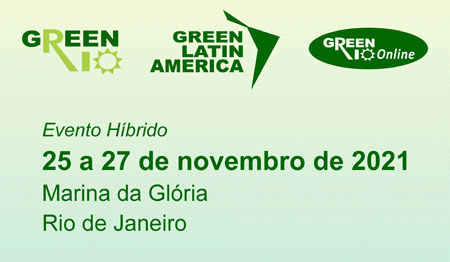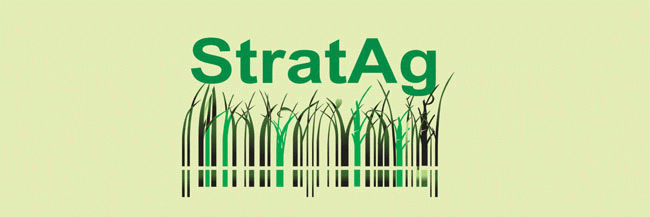
In the morning of July 29, the Superintendent of Sebrae in the State of Mato Grosso (“Sebrae MT”), José Guilherme Barbosa Ribeiro, welcomed over 400 participants to the 4th Sebrae Sustainability Seminar, held in Cuiabá from July 29 to 31, addressing the theme Businesses that Transform Realities. Entrepreneurs from various sectors and directors and managers of the Sebrae System were present.
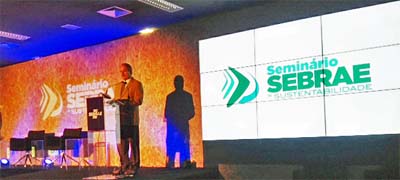
José Guilherme Barbosa Ribeiro
José Guilherme Ribeiro thanked all those who made their contributions so that each year the Sebrae Sustainability Seminar could consolidate its position, as a meeting point to debate and promote this theme, for their support. He reminded the audience that the objectives of this event are to stimulate good sustainability practices, to increase entrepreneurs’ awareness, and to influence actions in the small business segment.
In the opening ceremony, the president of the National Sebrae, Luiz Barretto, pointed out that the Sebrae Sustainability Seminar promotes a comprehensive agenda. “The sustainability issue is very important, and there is no contradiction between working on economic development and the sustainability agenda”.
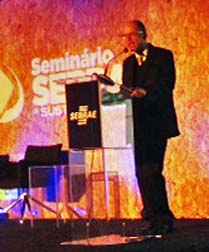
Luiz Barretto
According to Barretto, this is a one-way road, and those who arrive first will have the advantage. “The rational use of water, energy efficiency, the search for alternative energy sources and the reuse of materials are not just an environmental issue, but also economic”, he says, pointing out that the growth of populations, both worldwide and in Brazil, calls for new postures and is a challenge the planet is currently facing.
The Technical Director, Carlos Alberto dos Santos, gave a presentation about the tools offered by Sebrae and its commitment to sustainability. He reminded the audience that the Sebrae Sustainability Center (CSS) carried out a large-scale dissemination of information referring to the topic. “The customized infographics are a demonstration of good practices. The series addresses the commerce, service, industry and agro-business sectors”.
The CSS also makes available corporate videos and various publications, not to mention the Corporate University and SebraeTec, whose resources for the current year are around R$ 300 million.
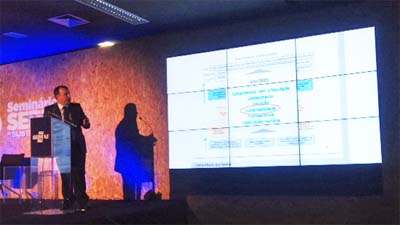
Carlos Alberto dos Santos
According to Carlos Alberto Santos, when Sebrae (a service that supports medium and small businesses) attends to people, sustainability is addressed in 19% of the cases throughout Brazil. This places sustainability second among the issues addressed, the first being design, with 21%. “In 2014, we are going to consolidate the Sebrae portfolio per segment, to work with people and interaction”.
Carlos Alberto pointed out that, when they become sustainable, these businesses become more competitive in relation to their competitors, and add greater value to their services.
There were two keynote addresses: Maritta Koch-Weser, an anthropologist, environmentalist and CEO of Earth 3000, talked about Global Reality and Transformation in Business; the economist Sérgio Besserman, Chairman of the Technical Chamber for Sustainable Development of the Rio de Janeiro Municipal Government, addressed the theme Leadership and Sustainable Management.
Maritta put the theme of “sustainability” into context, explaining that the concept appeared at the end of the 17th century, in Saxony, as a reaction against excessive, polluting mining activity and the devastation of forests. Jumping to the 20th century, Maritta talked about the beginning of Environmental Governance with the participation of civil society, with the first NGOs being formed, the mobilization of intellectuals from 1950 on, International Governance (Rio 92), Business and National Governance (SEMA – Environment Secretariat, IBAMA – Brazilian Institute for the Environment, MMA – Ministry for the Environment). The world’s population tripled in the 20th century, and the threats are increasingly difficult to control. Maritta highlighted Climate Change and Food Security as threats that must be urgently faced, reminding the audience that the world in 2014 is globally interlinked, that economic activities influence the climate and water, and that there is an interdependence of raw materials.
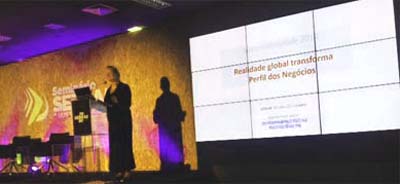
Maritta Koch-Weser
Just like Maritta, Sergio Besserman showed in his address how urgent it is to change the consumption paradigm, calling attention to the dangers the planet is facing due to climate change. Sérgio pointed out that ever since the time of the Industrial Revolution man has used natural resources thoughtlessly, ignoring one of the assumptions most often propounded by finance specialists: “That there is no free lunch. We are consuming the natural assets of a finite planet. And the consequences are immediate, they are not for future generations”, declared Besserman: “The ‘business as usual’ attitude is over. There is no technological solution for climate change while we continue to live in the era of fossil energy. A radical change is necessary in the thinking of the whole of society”, Besserman added.
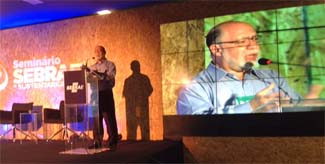
Sergio Besserman
MARITTA KOCH-WESER VISITS THE SEBRAE SUSTAINABILITY CENTER AND THE OFFICES OF SEBRAE MT, IN CUIABÁ.
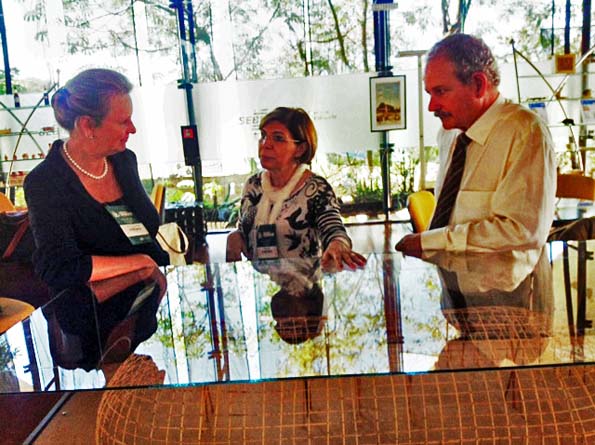
Maritta Koch-Weser, Suenia de Souza e José Guilherme Barbosa Ribeiro
During her stay in Cuiabá, Maritta Koch-Weser visited the Sebrae Sustainability Center (CSS) and also the offices of Sebrae MT.
The coordinator of the Sebrae Sustainability Center, Suenia de Souza, led Maritta on a guided visit to the CSS, explaining why the Center has become a national benchmark in sustainability, not only for the educational material it develops, but also for the construction of the building, which followed the concepts of sustainable buildings.
The CSS works to procure benchmarks, data and corporate cases in partnership with a network of interlocutors and collaborators throughout the country. The aim is to generate knowledge about trends; to produce sectorial analyses and publications; to develop methodologies and corporate data bases with stories of success in sustainable business; and to disseminate the information to the target public so that it reaches this target in a segmented manner, respecting the size and needs of each company.
Situated in Cuiabá (MT), since 2010 the Sebrae Sustainability Center has been building a data base with specialized content that is accessible to the various sectors of the national economy.
The Superintendent of Sebrae MT, José Guilherme Ribeiro, took Maritta to see the local entity’s offices, where they both talked about the strategic position of the State of Mato Grosso, which encompasses 3 biomes (the Amazon, Cerrado and Pantanal regions), for sustainable development in Brazil. The synergies between Earth 3000 and the Sebrae Sustainability Center will be analyzed with a view to promoting joint actions.
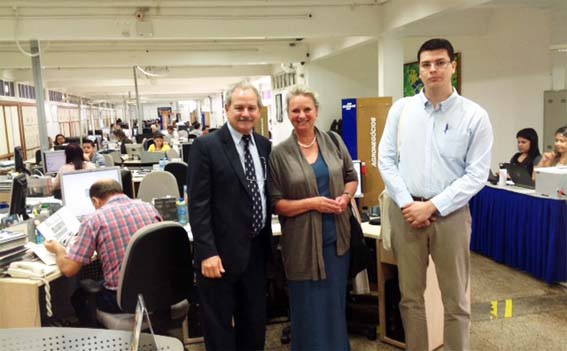
José Guilherme Ribeiro, Maritta Koch-Weser e André Schelini
__________________________________________________________________________________________________________________
|
Set of rules drawn up by ABNT with the support of Sebrae will be a benchmark for sustainability in hotel services |
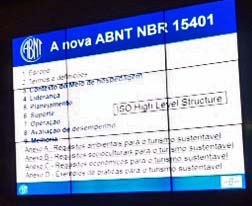 Entrepreneurs in the tourist sector now have a new quality benchmark for the services provided by hotels, guest houses, resorts, camping sites and hostels throughout the country.
Entrepreneurs in the tourist sector now have a new quality benchmark for the services provided by hotels, guest houses, resorts, camping sites and hostels throughout the country.
At the opening ceremony of the 4th Sebrae Sustainability Seminar, the Brazilian Association for Technical Norms (ABNT) launched a set of norms to be met by entrepreneurs with a view to achieving recognition for their establishments as sustainable means of accommodation. Published in 2012, Norm ABNT NBR 15401 was updated in partnership with Sebrae, and includes an attachment with examples of good practices that should be adopted in sustainable tourism.
Sebrae gives support to small businesses, by means of technical consulting services, in the implementation of Norm ABNT NBR 15401. For this purpose, the Sebraetec Program subsidizes up to 80% of the costs for entrepreneurs.
As Carlos Alberto dos Santos – Sebrae’s National Technical Director – explains, “So that we may advance in quality programs in the sector, it is essential that we all speak the same language. If companies adopt the same technical norms, we will surely have a new level of competitiveness in the sector.”
Drawn up through a partnership between Sebrae and the ABNT, the technical norm benefited from the participation of representatives of small businesses in the building process, and will be available, together with the attachment illustrating sustainable practices, through the link www.portalmpe.abnt.org.br. The entrepreneur needs to register his/her company in order to have free access to the material. Adhering to the technical norm is voluntary on the part of each accommodation enterprise.
__________________________________________________________________________________________________________________

